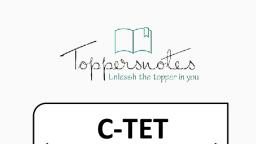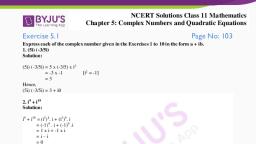Question 1 :
If $a + b + c = abc$, then how many real number solutions are possible ?
Question 3 :
Ordered pair that satisfy the equation $x + y + 1 < 0$ is:
Question 5 :
If $47.2506 $ $\displaystyle =4A+\frac{7}{B}+2C+\frac{5}{D}+6E,$ then the value of $5A + 3B + 6C + D + 3E$ is:
Question 8 :
Five times $A's$ money added to $B's$ money is more than Rs. $51.00$. Three times $A's$ money minus $B's$ money is Rs. $21.00$. If $a$ represents $A's$ money in dollars and $b$ represents $B's$ money in rupees, then
Question 10 :
$X$ is $36$ years old and $Y$ is $16$ years old. In how many years will $X$ be twice as old as $Y$?
Question 11 :
<div>State true or false:</div>The statement $0>1$ $\rightarrow$ $\sin x = 2$.
Question 15 :
Solve the linear inequations and represent the solution set on the number line.<br/>(a) $9\geq 7x-5\geq 5x-11,x\in R$<br/><br/>(b) $-2\le \cfrac{1}{2}-\cfrac{2x}{3}\leq 1\cfrac{5}{6},x\in N$
Question 16 :
To make $0$ as the root of the quadratic equation ${ ax }^{ 2 }+(2b+6)x+(c-4)=0$
Question 17 :
If the roots of a quadratic equation $ax^2+bx+c=0$ are all real then which one of the following is true?
Question 18 :
Solve using middle term splitting $\dfrac{3}{{x + 1}}\,\, - \,\,\dfrac{1}{2}\, = \,\,\dfrac{2}{{3x - 1}}$
Question 19 :
Determine the nature of roots of the equation $x^2 + 2x\sqrt{3}+3=0$.<br>
Question 20 :
The real roots of the equation $x^{2/3} + x^{1/3} - 2 = 0$ are
Question 21 :
For the equation $\left| { x }^{ 2 } \right| +\left| x \right| -6=0$.
Question 23 :
If $(x+k)$ is a common factor of $(x^2+px+q)$ and $(x^2+lx+m)$, then the value of $k$ is ____.
Question 25 :
If $x > 0$, and $x^2 - 6x - 7 = 0$, what is the value of $x$?
Question 26 :
If the ratio of the roots of the equation $p{ x }^{ 2 }+qx+r=0\quad $ is $a: b$, then $\cfrac { ab }{ { \left( a+b \right) }^{ 2 } } $ is equal to
Question 27 :
$\displaystyle \frac{2}{3}$rd of a number when multiplied by $\displaystyle \frac{3}{4}$th of the same number make 338.The number is
Question 28 :
Ajay and Vijay solved an equation. In solving it, Ajay made a mistake in the constant term only and got the roots as $8$ and $2$, while Vijay made a mistake in the coefficient of $x$ only and obtained the roots as $-9$ and $-1$. The correct roots of the equation are
Question 29 :
Find the value of $a$ if the value of <b></b>$2{x^2} + 3x - 5a$ equal $4$ at $x = -2$
Question 31 :
If the roots of the equation $ax^2+bx+c=0$ are all real equal then which one of the following is true?
Question 32 :
A teacher on attempting to arrange the students for mass drill in the form of a solid square found that $24$ students were left. When he increased the size of the square by one student, he found that he was short of $25$ students. Find the number of students.
Question 33 :
If every pair from among the equation ${x^2} + px + qr = 0,\,{x^2} + qx + pr = 0$ and ${x^2} + rx + pq = 0$ has a common root, then the sum of the three common roots is
Question 34 :
If $(3^{x^2})(9^x)(3) = 27$ and $x>0$, compute the value of $x$.
Question 35 :
Find the nature of roots of the equation ${ x }^{ 2 }+ax+b=0$, where $a=2\sqrt{b}$ and $b> 3$
Question 36 :
The values of k for which each root of the equation , $x^2-6kx+2+ 2k+9k^2 = 0$ is greater than 3, always satisfy the inequality :
Question 37 :
If $(x, y)$ is a solution of $x^{2} + y^{2} = 160$ and $y = 3x$, then $y^2$ is equal to
Question 38 :
If $\left| {{z_1}} \right| = \left| {{z_2}} \right|$ and arg $\left( {{{{z_1}} \over {{z_2}}}} \right) = \pi $, then ${z_1} + {z_2}$ is equal to
Question 42 :
If $1,\omega ,\omega ^2$ are the cube roots of unity, then the value of $(2+\omega )(2+\omega ^2)(2+\omega ^{10})(2+\omega ^{11})$ is
Question 44 :
For any complex number $z$, the minimum value of $\left| z \right| +\left| z-1 \right| $ is
Question 46 :
If $\displaystyle \left| \frac { z+1 }{ z+i }\right| =1$, then the locus of $z$ is
Question 47 :
A complex number is represented by an ordered pair $(a,b)$, which of the following is true for $a$ and $b$?
Question 51 :
The sum of two complex numbers $a + ib$ and $c+ id$ is purely imaginary if
Question 54 :
If $n$ is any positive integer, then the value of $\displaystyle \frac{i^{4n+1}-i^{4n-1}}{2}$ equals:
Question 55 :
Let $z_r(i \leq r \leq 4)$ be complex numbers such that $ |Z_r|=\sqrt{r+1}$ and $ |30z_1+20z_2+15z_3+12z_4|=K|z_1z_2z_3+z_2z_3z_4+z_3z_4z_1+z_4z_1z_2|$. Then the value of k equals
Question 57 :
The sum of two complex numbers $a + ib$ and $c +id$ is a real number if
Question 58 :
${z}_{1}$ and ${z}_{2}$ are two complex numbers such that $\left| { z }_{ 1 } \right| =\left| { z }_{ 2 } \right| $ and $arg({z}_{1})+arg({z}_{2})=\pi$, then ${z}_{1}$ is equal to:
Question 59 :
Let z be a complex number such that the principal value of argument, arg $z < 0$. Then $arg(-z) - arg (z)$ is
Question 60 :
If $|z-1| \leq 2$ and $|\omega z-1-\omega^2|=a$ (where $\omega$ is a cube root of unity), then complete set of values of $a$ is
Question 61 :
The value of $\displaystyle \left | \sqrt{\left \{ arg z+ arg (-\bar z)-2\pi\right \}\left \{ arg(-z)+arg(\bar z) \right \}} \right |$ is equal to $\displaystyle (\forall x+iy,i=\sqrt-1,x,y>0)$<br/>
Question 62 :
If $|z - 3i| = 3$ and $arg \ z \in \left ( 0 , \displaystyle \frac{\pi}{2} \right )$ then $cot (arg z) - \displaystyle \frac{6}{z}$ is equal to ......................
Question 63 :
$\alpha,\ \beta$ are complex cube roots of unity and $x=a+b,\ y=a\alpha+b\beta$ , $ z=a\beta+b\alpha$ then ${ x }^{ 3 }+{ y }^{ 3 }+{ z }^{ 3 }=$<br>
Question 66 :
The argument of the complex number $\sin \left (\dfrac {6\pi}{5}\right ) + i\left (1 + \cos \dfrac {6\pi}{5}\right )$ is
Question 67 :
lf $z_{1}$ and $z_{2}$ are two complex numbers such that $|z_{1}|=|z_{2}|+|z_{1}-z_{2}|$, then $\arg(z_{1})-\arg(z_{2})$<br/>
Question 68 :
If $p, q, r$ are positive integers, then remainder when<br>$\quad x^{3p} + x^{3q+1} + x^{3r+2}$<br>is divided by $x^2 + x+ 1$ is
Question 69 :
If $ \omega $ and $ \omega^2$ (where $\omega$ is a non-real cube root of unity) are two vertices of an equilateral triangle in the Argand plane, then the third vertex $z$ may be represented by
Question 70 :
If $z = - 2 + 2 \sqrt{3} i$, then $z^{2n} + 2^{2n}.z^n + 2^{4n}$ is equal to
Question 71 :
If $\displaystyle \left(\frac{3}{2}+i \frac{\sqrt{3}}{2}\right)^{100}=3^{50}(x-iy) $ where x,y are real,$\displaystyle i=\sqrt{-1},$ then the value of $\displaystyle \frac{y}{x} $ equals<br>




























